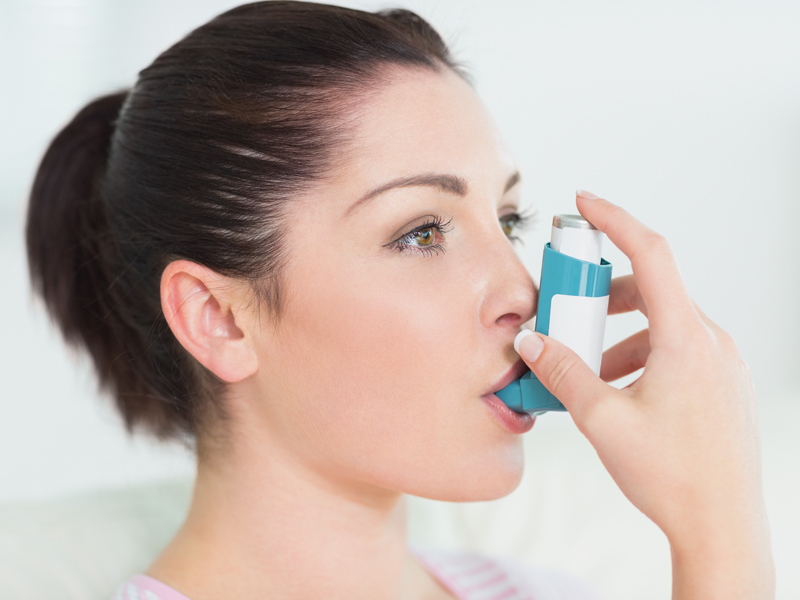Get Easy Health Digest™ in your inbox and don’t miss a thing when you subscribe today. Plus, get the free bonus report, Mother Nature’s Tips, Tricks and Remedies for Cholesterol, Blood Pressure & Blood Sugar as my way of saying welcome to the community!
Wonder vitamin cuts severe asthma attacks in half

If you have asthma attacks, allergies or a tendency toward respiratory infections, you can breathe a sigh of relief. There’s a vitamin that can improve your respiratory health tremendously.
It’s the same vitamin that helps prevent osteoporosis, cancer, diabetes, cardiovascular disease and multiple sclerosis — vitamin D.
One recent study published in the Cochrane Library (a UK medical research database) found that people with asthma who took vitamin D reduced their severe asthma attacks — the kind that requires immediate medical attention — by 50 percent.
That means they spent a lot less time in the emergency room or a hospital bed. They also had less mild or moderate asthma attacks, reducing their need for steroid pills.
But this isn’t the first time researchers have linked vitamin D to better respiratory health. In previous studies, vitamin D also:
- Decreased the risk of upper and lower respiratory infections
- Reduced the risk of tuberculosis and improved recovery time from tuberculosis
- Increased lung capacity for people with asthma and wheezing diseases
- Reduced bacteria in the airways of people with cystic fibrosis
The secret may lie in vitamin D’s anti-viral superpowers. It keeps your immune system strong, which means fewer bacteria can enter your airways and infect your lungs. It also decreases your risk of getting a cold or flu. And, as you probably know, viruses like those can leave you with a respiratory infection that lasts for weeks or even months afterward.
As the icing on the cake, vitamin D reduces respiratory inflammation, promoting easier breathing. Vitamin D’s ability to ease inflammation also explains why it can help people with asthma — a disease that results in inflammation in the airways.
The sad fact is most Americans aren’t getting enough of this so-called “sunshine vitamin.” And, if you’re one of them, it could contribute to your respiratory problems.
So if you’re sick of coughing, wheezing and struggling for breath, you’ll want to add vitamin D to your respiratory health regimen ASAP. Here’s how you can get started:
- Get your vitamin D levels tested. If your levels are below 75 nmol/L (nanomoles per liter of blood), you could stand to get more vitamin D… but you’re not quite deficient. Anything below 50 nmol/L is officially considered vitamin D deficient. And if your levels are below 25 nmol/L, you’re deficient. So start supplementing stat.
- Most doctors recommend 500 to 1000 IU of vitamin D daily for asthma or other respiratory problems. That’s a pretty conservative dosage. If you’re deficient or severely deficient, you’ll probably want to take more (other medications, certain medical conditions, weight and age can compromise vitamin D).
- 5,000 IU of vitamin D daily is considered a safe and therapeutic dosage for adults. It sounds like a lot. But it’s nowhere near 10,000 IU per day, the amount that can cause toxicity. Never take more than 5,000 IU daily unless directed by a physician.
Editor’s note: Regain your health and enjoy a full, vibrant life by defeating the real culprits of premature aging and sickness — excessive, damaging acid in your body! The truth is when you’re alkaline, wellness thrives and sickness takes a dive. Click here to discover The Alkaline Secret to Ultimate Vitality!
Sources:
-
R. Martineau, et al. “Vitamin D for the management of asthma.” Cochrane Database of Systematic Reviews 2015, Issue 3. Art. No.: CD011511.
-
A. Hughes. “Vitamin D and respiratory health.” Clinical & Experimental Immunology, 2009 Oct; 158(1): 20–25.
-
“Respiratory infections.” The Vitamin D Council. https://www.vitamindcouncil.org. Retrieved September 10, 2016.
-
“Asthma.” The Vitamin D Council. https://www.vitamindcouncil.org. Retrieved September 10, 2016.













